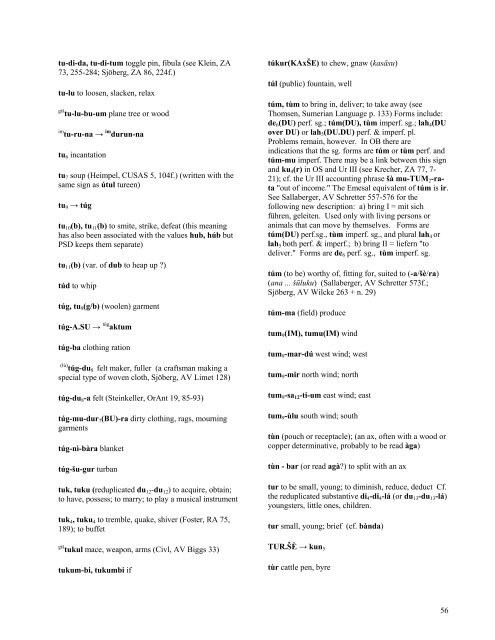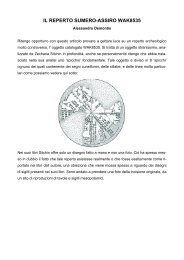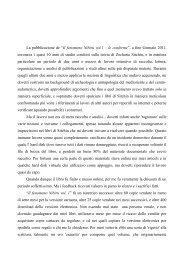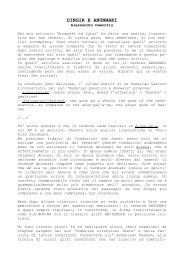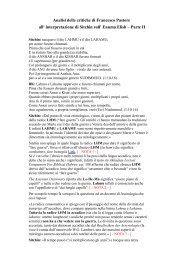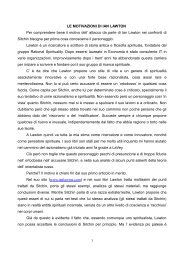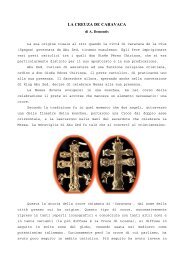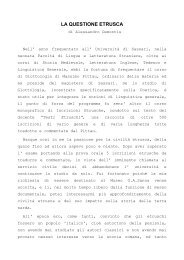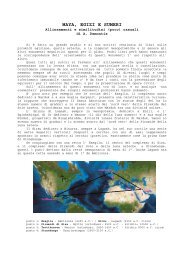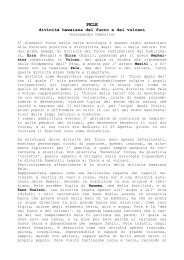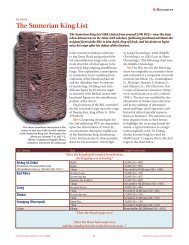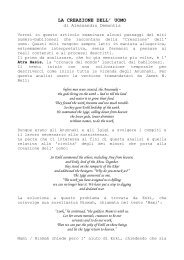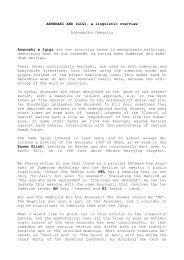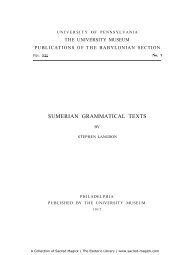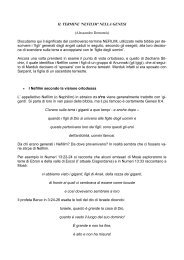Elementary Sumerian Glossary
Elementary Sumerian Glossary
Elementary Sumerian Glossary
Create successful ePaper yourself
Turn your PDF publications into a flip-book with our unique Google optimized e-Paper software.
tu-di-da, tu-di-tum toggle pin, fibula (see Klein, ZA<br />
73, 255-284; Sjöberg, ZA 86, 224f.)<br />
tu-lu to loosen, slacken, relax<br />
giš tu-lu-bu-um plane tree or wood<br />
im tu-ru-na → im durun-na<br />
tu6 incantation<br />
tu7 soup (Heimpel, CUSAS 5, 104f.) (written with the<br />
same sign as útul tureen)<br />
tu9 → túg<br />
tu10(b), tu11(b) to smite, strike, defeat (this meaning<br />
has also been associated with the values hub, húb but<br />
PSD keeps them separate)<br />
tu11(b) (var. of dub to heap up ?)<br />
túd to whip<br />
túg, tu9(g/b) (woolen) garment<br />
túg-A.SU → túg aktum<br />
túg-ba clothing ration<br />
(lú) túg-du8 felt maker, fuller (a craftsman making a<br />
special type of woven cloth, Sjöberg, AV Limet 128)<br />
túg-du8-a felt (Steinkeller, OrAnt 19, 85-93)<br />
túg-mu-dur7(BU)-ra dirty clothing, rags, mourning<br />
garments<br />
túg-nì-bàra blanket<br />
túg-šu-gur turban<br />
tuk, tuku (reduplicated du12-du12) to acquire, obtain;<br />
to have, possess; to marry; to play a musical instrument<br />
tuk4, tuku4 to tremble, quake, shiver (Foster, RA 75,<br />
189); to buffet<br />
giš tukul mace, weapon, arms (Civl, AV Biggs 33)<br />
tukum-bi, tukumbi if<br />
túkur(KAxŠE) to chew, gnaw (kasāsu)<br />
túl (public) fountain, well<br />
túm, tùm to bring in, deliver; to take away (see<br />
Thomsen, <strong>Sumerian</strong> Language p. 133) Forms include:<br />
de6(DU) perf. sg.; túm(DU), tùm imperf. sg.; lah4(DU<br />
over DU) or lah5(DU.DU) perf. & imperf. pl.<br />
Problems remain, however. In OB there are<br />
indications that the sg. forms are túm or tùm perf. and<br />
túm-mu imperf. There may be a link between this sign<br />
and ku4(r) in OS and Ur III (see Krecher, ZA 77, 7-<br />
21); cf. the Ur III accounting phrase šà mu-TUM2-rata<br />
"out of income." The Emesal equivalent of túm is ir.<br />
See Sallaberger, AV Schretter 557-576 for the<br />
following new description: a) bring I = mit sich<br />
führen, geleiten. Used only with living persons or<br />
animals that can move by themselves. Forms are<br />
túm(DU) perf.sg., tùm imperf. sg., and plural lah4 or<br />
lah5 both perf. & imperf.; b) bring II = liefern "to<br />
deliver." Forms are de6 perf. sg., tùm imperf. sg.<br />
túm (to be) worthy of, fitting for, suited to (-a/šè/ra)<br />
(ana ... šūluku) (Sallaberger, AV Schretter 573f.;<br />
Sjöberg, AV Wilcke 263 + n. 29)<br />
túm-ma (field) produce<br />
tum9(IM), tumu(IM) wind<br />
tum9-mar-dú west wind; west<br />
tum9-mir north wind; north<br />
tum9-sa12-ti-um east wind; east<br />
tum9-ùlu south wind; south<br />
tùn (pouch or receptacle); (an ax, often with a wood or<br />
copper determinative, probably to be read àga)<br />
tùn - bar (or read agà?) to split with an ax<br />
tur to be small, young; to diminish, reduce, deduct Cf.<br />
the reduplicated substantive di4-di4-lá (or du13-du13-lá)<br />
youngsters, little ones, children.<br />
tur small, young; brief (cf. bànda)<br />
TUR.ŠÈ → kun5<br />
tùr cattle pen, byre<br />
56


